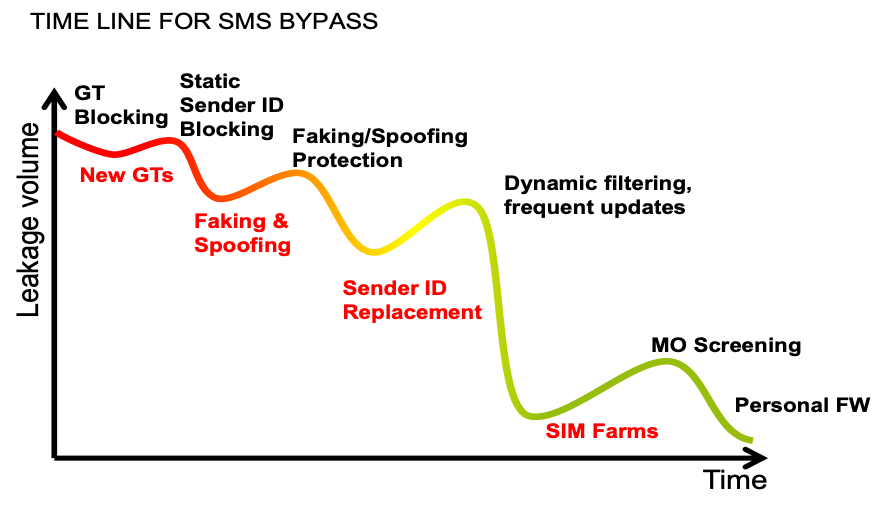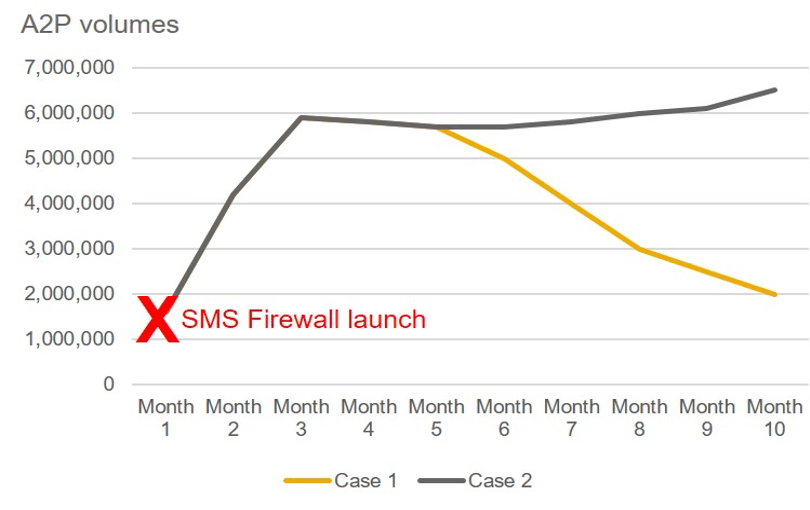The importance of an SMS firewall can’t be underscored in a global economy. Industry studies show that international connections are often the most exposed to A2P revenue leakages and cost bypass.
Linked entities proliferate and are frequently subjected to ‘gentleman’ agreements so that SMS can be terminated, even for free.
The so-called Roaming Agreement rule for international relationships between operators frequently allows free or low cost termination under the principle that such routes shall not be used for commercial purposes.
A2P traffic increase after SMS firewall implementation
Protecting international traffic generally has a low impact on budget and manpower, foremost if using a cloud-based, third-party solution. Domestic traffic protection typically requires significantly larger systems and local set-up, which has a major impact on budget and human resources.
Many operators, therefore, choose the first approach under the assumption that domestic connections, smaller in number and managed by account responsible, are more controllable.
The graph below summarizes the experience of two Mobile Network Operators (MNOs) in the same region and similar in size that implemented different solutions. Both operators had basic protection measures in place and suffered:
- fraud
- spam
- revenue leakages
MNO A implemented a fully-fledged SMS firewall with managed services, and international and domestic traffic control. A2P traffic increased during the first two months after implementation. By the fourth month, traffic is subject to a normalization curve where cost bypass is mostly eradicated and only legitimate traffic is being delivered.
MNO B opted for international traffic protection only and this resulted in some immediate impact, but no further growth: In this case, as it frequently happens, domestic P2P routes were less expensive than enterprise messaging routes, so that cost bypass migrated from international to domestic connections that were not filtered by the firewall. The resulting traffic leakage might be as high as the delta to Operator A traffic.
Now you’d probably buy an SMS Firewall to cover for both domestic and international traffic, the next question is: do you have the resources to operate and maintain it? Let’s explore consequences of poor maintenance and advantages of managed services.
Have a feeling that your A2P revenues are leaking even if you have a top technology SMS firewall?
Enforcing control on traffic can prove more difficult than you may assume. In fact, even the most efficient technical solutions might fail if not constantly updated: spam and cost bypass are moving targets with fraud techniques being continuously evolved.
The performance of an SMS firewall over time fully depends on the dedication of A2P and P2P experts that tune parameters and rules on a daily basis to capture new bypass and fraud scenarios.
With many mobile operators primarily focused on 5G implementations, only a few carriers have the necessary knowledge and resources to maintain a SMS firewall efficiently.
The potential impact on A2P traffic volumes of a poorly maintained firewall is shown below:
A2P volumes evolution after firewall implementation: poor vs. efficient tuning
Case 1 depicts how traffic evolution could develop in case a firewall (even a high technology one) is not regularly tuned.
The launch of an SMS firewall normally coincides with a significant increase in A2P traffic: all bypass over P2P routes is stopped thanks to initial configuration that we assume to be state of the art. But fraud evolves over time, and new fraud techniques find ways to bypass old filters. This reflects in a fall of A2P traffic that can be as low as 80% loss.
Case 2 shows the implementation of an efficient, vendor-based SMS firewall solution with managed services.
Usually this solution includes valued add services such as threats prevention measures that cannot be provided in-house. For example, some reputable providers host a global threats database that automatically updates customers’ firewalls whenever an attack occurs worldwide. This can prevent fraud and bypass even before they occur on the network.
Software based SMS firewalls with managed services are a recommended choice for operators willing to fully monetize A2P, despite any manpower constraints.




